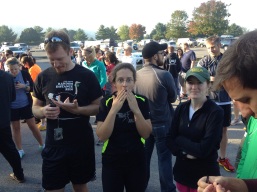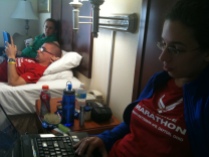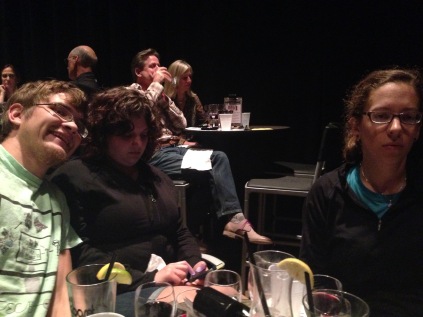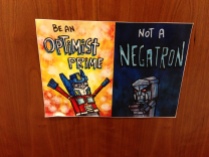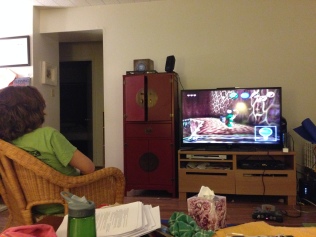Read any news outlet–measles, a disease declared in 2000 to have been eradicated in the United States, has now infected nearly 100 people across at least a dozen states with no sign of slowing down just yet.
The single glimmer of hope in this utterly preventable outbreak is the fact that it’s forced our collective hand: we are now having a vigorous discussion about the merits of vaccinating ourselves and our children. And it would seem, the antivax community is on its heels.
But my worry isn’t the strict anti-vaxxers. My chief worry are the folks who espouse the reasonable-sounding rhetorical device of “I’m not anti-vaccine, I just think parents should have a choice.”
I’ve been accused before of not being warm and cuddly enough with people whose beliefs differ from mine. For instance, I posted this video on Facebook, and among other things it sparked some disapproval from folks who felt put out by the directness of its message:
[youtube https://www.youtube.com/watch?v=RfdZTZQvuCo]
Yes, I was effectively tone-policed. But in the spirit of informing people, I’m going to stick to the facts in the remainder of this post. I’m also not going to pull any punches. No rhetorical devices, no heavy-handed hyperbole, just facts.
So let me direct your attention to this Blaze article by Matt Walsh, a self-proclaimed “professional truth sayer,” titled: “So Should We Just Round Up the Anti-Vaccine Parents And Ship Them to Guantanamo?”
The title sets the stage adequately for what follows.
Evidently, Statist zealotry has gone mainstream. This post, tragically, isn’t as irrelevant as I’d hoped.
Already the “tone” has reached rhetorically objectionable levels. If I was on the fence about my own position, I’ve already firmly made my decision (either way) and I’m literally 4 paragraphs in.
What I’m talking about here are our rights and our liberties, both as individuals and as parents. So go ahead, as many people have in the last day, and call me “anti-vaccine” or a “vaccine truther,” but then realize that you’re murdering the potential for a substantive discussion by, rather than engaging a point, simply categorizing it. And, in this case, categorizing it dishonestly. If I have to be “anti” or “pro” vaccines, I’m in the latter camp, seeing as how I chose to have my kids vaccinated. But I’m also pro-freedom, which makes me, perhaps, a man without a country in this particular argument.
[emphasis mine, and throughout the rest of this post]
I’ll briefly mention the first bolded section as a blatant contradiction to the fact that he already “murdered” the potential for a substantive discussion by the very title of his article. Unless anyone here seriously thinks shipping people to Guantanamo is going to be effective? This guy is too smart to believe that, which leaves only rhetoric, thereby torpedoing his otherwise-wanted “substantive discussion.”
I also don’t think you’ll find anyone who isn’t “pro-freedom.” It’s a meaningless platitude meant to divide people into groups that don’t exist. To accuse anyone, especially US citizens, of being “anti-freedom” is an absurd dichotomy that reveals only an ulterior agenda on the part of the person making the distinction.
In short: it’s an immediate flag that tells anyone listening that this person’s motives are questionable at best.
In short, as we have seen time and time again, despite Ben Franklin’s urges to the contrary, many people will choose safety over liberty, no matter how slight the risk and how serious the infringement. But while they worry about a potential public health emergency, I worry that the Salem witch trial mentality has created a constitutional emergency.
Aside from the ridiculous rhetoric (which I’m not even going to address anymore, even though it pervades the rest of his article, piling even more fuel on the hypocritical flame of “if only the pro-vaccine crowd would say something substantive”), applying Ben Franklin’s quip about trading freedom for safety to vaccinations is absurd. What liberty are parents abdicating? The liberty to say “no” to vaccines? Is that all?
You’re willing to put countless lives at risk–lives you’ll never have any clue you’ve risked–just for the right to say no?
Do you see how the two scenarios aren’t even close to similar? They’re not just dissimilar in probability, but in substance. When you get behind the wheel after downing a pint of vodka, you are immediately and directly endangering everyone around you. But an unvaccinated child isn’t a danger unless he’s sick, and even then it depends on what he’s sick with, and even then he isn’t the same degree of dangerous to everyone, considering that many of the people around him are fully vaccinated. So driving drunk is more equatable to declining vaccines so that your child will purposefully get sick so that you can intentionally release him into a public space where other unvaccinateds hang out so that you can willfully get them sick. This choice I would disagree with. In fact, it should be illegal. It probably already is. But if you can’t see how that bizarre scenario isn’t quite the same as the scenario of simply opting out of the vaccine to begin with, then there’s probably little hope of a reasonable discussion here.
The problem with analogies is that they’re usually wrong. Nevertheless, the author hits on the main point: “considering that many of the people around him are fully vaccinated.” That only happens when many of the people around him get their vaccines on schedule.
This also completely ignores the very real phenomenon of the incubation period–that variable time frame between when one is infected, and when one begins to show symptoms. Sometimes the person isn’t contagious (ebola), but sometimes they are; they’re actively spreading a disease they don’t even know they have.
Even pro-vaccine-compulsion people (as opposed to just pro-vaccine people, like myself) admit that there are at least some circumstances where not getting vaccinated would be the right course of action. Specifically, for a child who has cancer or is immunodeficient. This further separates non-vaccination from other “risky” behaviors, in that those other behaviors are intrinsically wrong and never OK, whereas even the most ardent folks in the pro-vaccine-compulsion camp (PVC) allow for exceptions. Quite magnanimous of them, isn’t it?
If you’re asking “is it possible to hold a nuanced view on a tricky topic with a blurry line that is complicated,” then the answer is “yes.”
But in the case of vaccines, it’s not tricky. It’s not blurry. It’s actually quite straightforward: if your immune system is healthy, you get vaccinated. If not, you can’t get vaccinated. There is no allowance for won’t. Simple.
First of all: if vaccines are forced or unvaccinated kids are treated like lepers, segregated in colonies and prohibited from schools and public facilities, would that apply to a child who has leukemia or who’s in some other vaccine-disqualifying situation? Taking vaccines out of it, children with compromised immune systems get sick more frequently, and because they get sick more frequently, they are a “risk” to those around them. What should the government do about them?
He completely misses the point here. The point is that people who can’t get vaccinated rely on everyone else to get vaccinated. The proportion of immuno-compromised individuals is small enough that, if everyone else who could receive their vaccinations did, there’d be more than enough for herd immunity to take effect, allowing the unvaccinated to live safely among the vaccinated.
Allowing for people to opt out for reasons that seem to consist exclusively of “because I can” completely obliterates this precious balance, putting those who have no choice in the matter in danger.
The flu kills far more people than the measles, and it’s very contagious. Should it be required? Should the Non-Flu-Shot Kids be kicked out of class until they get that stuff injected into their bodies? Even if it’s ineffective? Should we all be required? I’ve never had a flu shot, should I be convicted of some kind of crime? As I said, my son got the shot recently. On Wednesday he was back at the doctor with a fever and respiratory problems. We were told that these were entirely unrelated, but I think next year we will be declining the procedure. I know it doesn’t protect against every strand of the flu, but this is a medical decision and a personal judgment call, and I am repulsed at the notion that I shouldn’t have the right to make it.
Yes, even if it’s ineffective. Flu vaccines aren’t binary; they provide degrees of protection. Some years are better than others for sure, but if you can add an extra layer of protection, however small, why wouldn’t you?
His second bolded statement is infuriating. We humans are excellent at recognizing patterns, even when they don’t even exist. This is the entire basis for the anti-vaccine movement. If every spurious correlation was immediately assumed to be causative, we would have dumped funding in science, space, and technology long ago in a bid to lower the suicide rate.
These “pro-choice” and “pro-freedom” individuals make a rhetorical argument that certainly sounds nice–“I want the freedom to choose”; doesn’t that sound like something we all want?–but what does it even mean? Why would one choose not to be vaccinated? Of course, if one is immuno-compromised or otherwise sick, there’s certainly an elevated risk for adversely reacting to a vaccine. But if all indicators are ok, what other reason is there to say no? Just because there’s still a non-zero chance of an adverse reaction? There’s a non-zero chance of being hit by a bus tomorrow; I suspect you’ll still go to work at some point, and you probably won’t even consider that risk.
Perhaps it’s because the risk of being hit by a bus is vanishingly small, as opposed to the risk of adverse reactions to vaccines, which is “merely” minuscule by comparison. As Dr. Laura McLay says in the linked article:
People are really bad at assessing risk. There is a huge risk analysis literature on how we tend to overestimate rare events, and this overestimation drives policy decisions.
If your next argument is “ok so we require vaccines, but what next? require x? require y?” That would be the slippery-slope fallacy, and a total deviation from the topic at hand. I’m talking about vaccines. Beyond one’s immediate health–which you should indeed discuss with your doctor!–there’s no reason to say no, and every reason to be vaccinated.
When you make the “choice” to abstain from vaccinations, you are also making a choice on behalf of the small but significant group of individuals who have no choice in the matter. Science doesn’t care about your choice; whether or not you think your risk is small enough to be ignored, you are at the same level of risk as everyone else (assuming you’re healthy). Influenza, measles, and whooping cough aren’t going to steer clear just because you’ve decided they don’t pose much of a threat.
By participating in this society of ours, you have certain obligations to help maintain the general order–things like paying taxes, obeying traffic laws, and generally trying to be a decent human being–and getting your vaccinations should be no different. We’re all in this thing together, and as I profoundly respect everyone’s right to live their lives however they see fit, getting your vaccinations on time will help everyone to do exactly that: it is of minimal risk to you, and to those for whom getting vaccinated isn’t an option, they can go about their lives confidently, because you made the responsible choice.
So for the love of all things good, get vaccinated. It’s not about diminishing freedoms, it’s not about taking away choice, it’s solely about everyone’s well-being. That’s it.
 Ouch. Photo by fellow UW Madison geographer Sigrid Peterson.
Ouch. Photo by fellow UW Madison geographer Sigrid Peterson. 




























